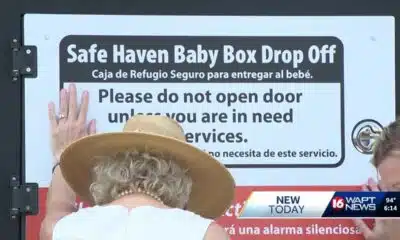Mississippi Today
House Speaker Jason White, staff treated to Super Bowl by gambling giant pushing for legalized betting
The sports gambling lobby, as it has done in other states, has spent hundreds of thousands of dollars on Mississippi politicians trying to convince them to legalize mobile sports betting.
Part of that effort was an unreported trip to the Super Bowl in New Orleans this year for House Speaker Jason White, his staff and a couple of their spouses. The trip was paid for, at least in part, by DraftKings, one of the nation’s highest-grossing gaming companies that has invested heavily in lobbying for legal online betting.
Thanks to a loophole in Mississippi’s lax lobbying laws, there is no public report to date of the expensive weekend in lobbying reports that are supposed to document spending on behalf of state employees. The cheapest tickets to the Super Bowl retailed for nearly $3,000 each. The group attended the game less than a week after White oversaw the House’s approval of legislation to legalize mobile sports betting in Mississippi.
The Republican speaker, one of the most powerful politicians in the state, has repeatedly said that legalizing mobile sports betting is one of his top priorities. He has continued to push for legal online betting after it has repeatedly died in the Senate. Proponents, such as White, say legalization would be a financial boon to the state. It would also further enrich the gambling companies that facilitate online betting.
The speaker and his staff enjoyed the Super Bowl weekend as mobile sports betting became one of the defining issues of the 2025 legislative session. White and the House leaders took the issue so seriously earlier this year that they blocked other legislation in response to the Senate’s opposition to legal sports betting, according to Senate leaders.
White and his spokesperson, who also attended the Super Bowl, refused to comment or answer questions about the Super Bowl trip.
While in New Orleans, White posed for a photograph in front of the Superdome with his wife, his taxpayer-funded security guard, two House staff members and the husband of one of his staffers. After Mississippi Today discovered the photo, DraftKings and John Morgan Hughes, whose Jackson-based Ten One Strategies firm lobbies for the Sports Betting Alliance, a group representing DraftKings and other gaming organizations, confirmed that the gambling industry paid for the game day tickets.
The Boston-based sports gambling giant has been at the forefront of a years-long lobbying push to legalize online betting in Mississippi and around the country. In a statement, a company spokesperson said DraftKings “follows the required reporting requirements in all jurisdictions, including Mississippi.”
The company declined to answer how much it spent on the group and whether it paid for perks beyond the game tickets in New Orleans — where some of White’s entourage documented extravagant Super Bowl festivities on social media.

Super Bowl trip was ‘unforgettable experience’
Taylor Spillman, White’s communications director, and her husband, Trey Spillman, who serves as Rankin County’s prosecuting attorney, photographed their weekend in the Big Easy.
They mingled in a luxury box suite at the Superdome, private spaces that cost between $750,000 and $2 million. They took photographs with celebrities such as former Today show host Hoda Kotb and Arkansas Gov. Sarah Huckabee Sanders. And there were pregame drinks at what appeared to be Brennan’s, the famed New Orleans Creole restaurant that served as the weekend stomping ground for guests of DraftKings.
A day after the Super Bowl, Trey Spillman took to social media to thank DraftKings for the experience.
“Unforgettable experience at Super Bowl LIX. Thank you @draftkings for the hospitality! #sports”
But after Mississippi Today asked the Spillmans this week about the trip, he edited the social media post to remove any mention of DraftKings and the company’s “hospitality.”
“Unforgettable experience at Super Bowl LIX. #sports,” the edited post reads.
The Spillmans did not respond to multiple messages seeking comment.


Online gambling money pours in to politicians
Mississippi Today asked DraftKings why the lobbyist registered to represent the company in Mississippi did not disclose the Super Bowl trip for the speaker’s family and staff in his most recent round of expenditure reports.
In response, a spokesperson for the company pointed to state lobbying law that gives the clients of lobbyists, in this case DraftKings, until the end of the year to document gifts to public officials.
Mississippi’s lobbying laws do allow for a distinction between individual lobbyists and clients, leaving open to interpretation what lobbyists and their clients are required to report and when they’re required to report their expenses. The DraftKings spokesperson said that distinction allows it to wait until the end of the year to report the excursion for White’s group. This means DraftKings is claiming the company or the Sports Betting Alliance, not its lobbyist, funded the Super Bowl outing.
Secretary of State Michael Watson’s office regulates lobbyists in Mississippi and enforces the state’s lobbying laws. Watson, who has accepted $1,000 himself from a DraftKings-affiliated PAC, and his office publish an annual lobbying guide.
In the most recent guide, it says a lobbyist’s client is only required to file an annual report the following January — nearly nine months after the regular legislative session ends. That is the provision DraftKings cited when asked why its lobbyist did not document the Super Bowl trip on the most recent report.
Elizabeth Jonson, a spokesperson for Watson’s office, told Mississippi Today in a statement that if a gambling company provided football tickets or other items of value to public officials “for the purpose of lobbying,” then the company is required to disclose those gifts, at some point, in their lobbying reports.

Unlike many other states, Mississippi has no “gift law” banning or limiting how much money lobbyists or others can spend on politicians or government officials.
In total, the Sports Betting Alliance, a group representing DraftKings and other gaming organizations, has spent approximately $454,000 since 2024 on lobbying fees and campaign donations to advocate for mobile sports betting, according to a review of campaign finance and lobbying reports.
Of that money, the Sports Betting Alliance has spent over $254,000 in Mississippi on lobbying expenses, ad campaigns and meals for lawmakers, according to lobbying records filed with the secretary of state.
The SBA and its employees have donated at least another $200,000 to Mississippi politicians, according to campaign finance reports since 2014. SBA routed the money through TenOne PAC, the PAC controlled by Hughes’ lobbying firm. Hughes and the firm have also contributed $32,500 of their own money to the PAC, which could have also been used for sports betting advocacy, although the PAC supports other causes as well.
Arkansas governor faced Super Bowl questions

At the Super Bowl, Huckabee Sanders posed with White’s spokesperson, Taylor Spillman. A year prior, the Arkansas governor faced questions about who paid her tab for a trip to the Super Bowl. Sanders later clarified that she and her husband paid for their commercial flight, hotel and tickets to the game. Arkansas, unlike Mississippi, has laws requiring politicians to report gifts from special interests and imposes limits on them.
Sanders’ spokesperson said she paid her own way again to this year’s Super Bowl in New Orleans.
In response to media reports about her trip to the 2024 Super Bowl, Arkansas officials acknowledged that Arkansas State Police provided security on the trip to Huckabee Sanders and her family.
White, the Mississippi speaker, also appears to have had state-funded security on his trip to this year’s Super Bowl.
One of the people photographed in New Orleans with White is the speaker’s designated security guard with the Department of Public Safety’s Executive Protection Division. When asked whether any state resources were used to send the guard to the Super Bowl with the speaker, Bailey Martin, a spokesperson for the state Department of Public Safety, said such state-funded protection would be “expected.”
“The speaker of the Mississippi House of Representatives has been assigned an executive protection detail for many years,” Martin said in a written statement. “It would be expected for agents assigned to the speaker’s detail to attend such events when traveling out of state.”
Two other state employees who work closely with the speaker in the House were photographed inside the Superdome with the Spillmans. One is White’s administrative assistant, and the other is a House committee assistant. There were seven people, including the speaker, photographed in front of the Superdome. Those involved have not disclosed whether others joined the Mississippi group.
The average Super Bowl ticket price this year was around $4,708, according to the online ticket platform TickPick, but prices varied widely.

The feverish push to expand the lucrative mobile sports betting industry in states around the country traces back to a change in the federal legal landscape.
Other legislation used as leverage for betting
Commercial sports betting was effectively banned, with a few exceptions, until 2018 when the U.S. Supreme Court overturned a 1992 prohibition. Sports gambling companies such as DraftKings then launched a full-court press lobbying campaign to bring sports betting to tens of millions of mobile phones around the country, an effort reported to be the fastest expansion of legalized gambling in American history.
Around 40 states have some form of legalized sports betting, though about 20 have full online betting with multiple operators, according to Action Network, a sports betting application and news site. Some states only have in-person betting, and some only have a single online operator in the state.
Mississippi has been one of the holdouts, largely due to fears that legalization could harm the bottom line of the state’s casinos and increase the prevalence of gambling addiction. Influential religious institutions in the Bible Belt state have also opposed the spread of gambling.
Mississippi allows sports betting now, but only inside casinos.
After passing the House in 2023 and 2024, legislation legalizing online betting has died in the Senate.
On Feb. 8, the day before the Super Bowl, White reminded his social media followers that Mississippi had attempted to legalize mobile sports betting for three years.
“We have now passed it again this year,” White wrote. “Your issue is on the other end of the Capitol.”

This session, White and powerful House leaders took an unusually bare-knuckled approach in their push for mobile sports betting.
Democratic Sen. David Blount, the Senate Gaming chairman, has refused to advance mobile sports betting out of his committee. He said House leaders appeared to retaliate this year by killing at least four other gaming-related bills.
One bill would have allowed the Mississippi Department of Human Services to collaborate with the state Gaming Commission to withhold cash winnings from people with outstanding child support, a sum totaling $1.7 billion. Federal data shows Mississippi has the worst child support collection rates in the nation and one of the highest rates of child poverty.
Another bill would have changed the law dealing with leasing state-owned water bottoms on the Gulf Coast, an issue important to casinos. All of the stalled bills were supported by Republicans.
“It certainly appears that the position of the House is, ‘We won’t pass any legislation related to gaming, even if it’s supported by a Republican statewide official or has the unanimous support of the Senate, the industry and regulators,’” Blount said. “None of that appears to be able to pass the House until they get mobile sports betting.”
In a separate move, House Ways and Means Chairman Trey Lamar attempted to increase taxes on Mississippi casinos, some of which have opposed mobile sports betting legalization. Lamar, one of White’s top lieutenants, made clear his casino tax increase proposal, which stood little chance of passing into law, was a political shot at the casino industry for the blockage of online betting.
White also attempted to leverage other legislation, including the state income tax and the public retirement system, to coerce the Senate into passing mobile sports betting, Senate leaders said.
Lt. Gov. Delbert Hosemann, who leads the Senate, did not respond to a request for comment.
Proponents of mobile sports betting in Mississippi say the state is losing between $40 million and $80 million a year in tax revenue by keeping mobile sports betting illegal. And sports gambling companies are losing out on a new customer base in Mississippi, which is home to a thriving illegal online gambling market.
Days after House lawmakers made those arguments on the floor of the Mississippi House in Jackson, the speaker’s staffers were enjoying the hospitality of DraftKings at its Super Bowl weekend festivities.
“We view these things as DraftKings in real life,” said Shawn Henley, DraftKings’ chief customer officer, of the company’s Super Bowl weekend events. “We also have tons of business partners and will spend a lot of time with them.”
Mississippi lawmakers will convene in a special legislative session in the coming weeks to finalize a state budget, as they were unable to agree on one during their regular session.
The governor has the power to set the agenda during a special session, and Gov. Tate Reeves has said he’s open to adding mobile sports betting legislation to the upcoming special session agenda.
This article first appeared on Mississippi Today and is republished here under a Creative Commons Attribution-NoDerivatives 4.0 International License.
Mississippi Today
Brain drain: Mother understands her daughters’ decisions to leave Mississippi
Editor’s note: This Mississippi Today Ideas essay is published as part of our Brain Drain project, which seeks answers to Mississippi’s brain drain problem. To read more about the project, click here.
Back when I was a kid in 1988, my mama and I had an argument about what I wanted to major in at college.
I had dreamed of being a journalist since the age of 8. To me, that meant that I was going to Ole Miss, which had the journalism department.
My mama said I could only go away from home to Ole Miss if I was going to major in law.
So I settled on going to Mississippi State University just down the road and majoring in communication. She told me I should major in engineering since that’s what State was known for.
I said, “That’s even dumber than me going to law school. I hate math.”
“Well, you could at least try,” she said.
I said no. Then she told me I was wasting my education and turned her back on me.
I get it. She knew and I knew that I couldn’t stay in Choctaw County where I was raised and earn a living with that degree. I would have to go somewhere else — probably to the Jackson metro area and work for Gannett or the Associated Press. Or to Memphis. Or Biloxi. Or even New Orleans. She never really forgave me for moving to the Jackson metro, working in my field and raising her grandchildren so far from her.
After a while, I got used to the pace of life around here. I knew I probably wouldn’t ever move anywhere else because I noticed that people who left Mississippi often came back, whether due to family obligations or a realization that “somewhere else” wasn’t quite all it was cracked up to be.
I also noticed that a lot of people played up how they were from Mississippi while making a very good living being someplace else. I decided I wanted to prove you could be from Mississippi, live in Mississippi, work in Mississippi and make something of yourself without leaving Mississippi.
But I noticed something else over the years, too. Most of the kids in Brandon dreamed of going off from home to cities like Atlanta, Nashville, Dallas, DC, New York or Orlando. They didn’t seem to have reasons — just a desire to get away from the state as fast as they could.
Then my three daughters and I started having conversations about what they wanted to major in when they went to college. My oldest wanted to be a chef. My middle one was undecided between chemical engineering and landscape architecture. And my youngest was fascinated with roads and bridges.
I was all too aware of what had happened in the job markets in Mississippi since I had come up. Companies closed operations in a globalized economy and fled to cheaper labor markets. The advent of the internet meant employers could hire from all over the world. Longtime business leaders retired and sold out to big corporations that reduced investments in local communities that had supported those businesses for decades and then complained that those towns didn’t offer enough amenities for their employees to want to relocate there.
But the reality really set in when my chef daughter chose her first internship — in historic Williamsburg, Virginia.
I would never have dreamed of driving that far from home to try out a place to work when I was her age. Then after her senior year, she interned at Walt Disney World and got hired full-time before the internship was over. She was off to live in Orlando where now with her husband and young son she’s creating community and loves going to work every day with a pretty enviable benefits package, too, a thing unheard of in the culinary world in Mississippi.
My middle one finally settled on chemical engineering and was picked for a co-op job in her first semester at age 18 at a company in Georgia. When she graduated four years later, we packed her off to Indiana for a research and development job, and she now lives in New Hampshire with her husband, making six figures a year at 26 years old and looking forward to partaking in the cultural offerings in New York City when she can.
The youngest is currently in college for civil engineering, and I’m bracing myself for the inevitable. She doesn’t want to work for state government, so she’s likely going out of state as well. Her comment about coming back to Jackson metro was the most damning of all. “There’s nothing to do here,” she says.
A lot of people ask me questions: How often do you see your daughters? How can you stand being so far from your grandson? Don’t they at least come home for Christmas?
The answer to all of those questions is that we do the best we can. We text, we message on Facebook, we talk on the phone at least once a week, every Sunday. We arrange visits; sometimes it’s us driving to them while other times they drive to us.
I can’t imagine making my children as miserable as my mom made me over my life choices. We are flexible, understanding, and very, very proud of our daughters, who are grappling with enough in their lives without us loading them down with guilt over when they are coming home.
The calculus may change in the future. We may have declines in health and need to move closer to one of our children if we need assistance. Or we may need to be in assisted living care here in Mississippi where such care may be marginally cheaper than wherever our girls land.
But I don’t wish our girls had settled for life in Mississippi.
What I wish is that Mississippi could find a way to live up to its potential — to be a place more worthy of my daughters’ loyalty, affections and investment in themselves.
Maybe it will be someday. I hope so, for all of our sakes.
Julie Liddell Whitehead lives and writes from Mississippi. An award-winning freelance writer, Julie covered disasters from 9/11 to Hurricane Katrina throughout her career. Her first book is “Hurricane Baby: Stories,” published by Madville Publishing. She writes on mental health, mental health education and mental health advocacy. She has a bachelor’s degree in communication, with a journalism emphasis, and a master’s degree in English, both from Mississippi State University. In 2021, she completed her MFA from Mississippi University for Women.
This article first appeared on Mississippi Today and is republished here under a Creative Commons Attribution-NoDerivatives 4.0 International License.
The post Brain drain: Mother understands her daughters' decisions to leave Mississippi appeared first on mississippitoday.org
Note: The following A.I. based commentary is not part of the original article, reproduced above, but is offered in the hopes that it will promote greater media literacy and critical thinking, by making any potential bias more visible to the reader –Staff Editor.
Political Bias Rating: Center-Left
This essay reflects a Center-Left perspective by focusing on social and economic challenges faced by Mississippi, such as brain drain, job market changes, and community decline. The tone is empathetic and advocates for investment in local opportunities and amenities to retain talent, aligning with progressive concerns about economic inequality and regional development. However, it remains largely personal and reflective rather than explicitly ideological or partisan. The article critiques systemic economic shifts without advancing a polarized political agenda, emphasizing hope for future improvement and a more supportive environment for young professionals.
Mississippi Today
After 30 years in prison, Mississippi woman dies from cancer she says was preventable
Behind Bars, Beyond Care:
A Mississippi Today investigation into suffering, secrecy and the business of prison health care
Susie Balfour, diagnosed with terminal breast cancer two weeks before her release from prison, has died from the disease she alleged past and present prison health care providers failed to catch until it was too late.
The 64-year-old left the Central Mississippi Correctional Facility in December 2021 after more than 30 years of incarceration. She died on Friday, a representative for her family confirmed.
Balfour is survived by family members and friends. News of her passing has led to an outpouring of condolences of support shared online from community members, including some she met in prison.
Instead of getting the chance to rebuild her life, Balfour was released with a death sentence, said Pauline Rogers, executive director of the RECH Foundation.
“Susie didn’t just survive prison, she came out fighting,” Rogers said in a statement. “She spent her final years demanding justice, not just for herself, but for the women still inside. She knew her time was limited, but her courage was limitless.”
Last year, Balfour filed a federal lawsuit against three private medical contractors for the prison system, alleging medical neglect. The lawsuit highlighted how she and other incarcerated women came into contact with raw industrial chemicals during cleaning duty. Some of the chemicals have been linked to an increased risk of cancer in some studies.
The companies contracted to provide health care to prisoners at the facility over the course of Balfour’s sentence — Wexford Health Sources, Centurion Health and VitalCore, the current medical provider — delayed or failed to schedule follow-up cancer screenings for Balfour even though they had been recommended by prison physicians, the lawsuit says.
“I just want everybody to be held accountable,” Balfour said of her lawsuit. “ … and I just want justice for myself and other ladies and men in there who are dealing with the same situation I am dealing with.”
Rep. Becky Currie, who chairs the House Corrections Committee, spoke to Balfour last week, just days before her death. Until the very end, Balfour was focused on ensuring her story would outlive her, that it would drive reforms protecting others from suffering the same fate, Currie said.
“She wanted to talk to me on her deathbed. She could hardly speak, but she wanted to make sure nobody goes through what she went through,” Currie said. “I told her she would be in a better place soon, and I told her I would do my best to make sure nobody else goes through this.”
During Mississippi’s 2025 legislative session, Balfour’s story inspired Rep. Justis Gibbs, a Democrat from Jackson, to introduce legislation requiring state prisons to provide inmates on work assignments with protective gear.
Gibbs said over 10 other Mississippi inmates have come down with cancer or become seriously ill after they were exposed to chemicals while on work assignments. In a statement on Monday, Gibbs said the bill was a critical step toward showing that Mississippi does not tolerate human rights abuses.
“It is sad to hear of multiple incarcerated individuals passing away this summer due to continued exposure of harsh chemicals,” Gibbs said. “We worked very hard last session to get this bill past the finish line. I am appreciative of Speaker Jason White and the House Corrections Committee for understanding how vital this bill is and passing it out of committee. Every one of my house colleagues voted yes. We cannot allow politics between chambers on unrelated matters to stop the passage of good common-sense legislation.”
The bill passed the House in a bipartisan vote before dying in the Senate. Currie told Mississippi Today on Monday that she plans on marshalling the bill through the House again next session.
Currie, a Republican from Brookhaven, said Balfour’s case shows that prison medical contractors don’t have strong enough incentives to offer preventive care or treat illnesses like cancer.
In response to an ongoing Mississippi Today investigation into prison health care and in comments on the House floor, Currie has said prisoners are sometimes denied life saving treatments. A high-ranking former corrections official also came forward and told the news outlet that Mississippi’s prison system is rife with medical neglect and mismanagement.
Mississippi Today also obtained text messages between current and former corrections department officials showing that the same year the state agreed to pay VitalCore $100 million in taxpayer funds to provide healthcare to people incarcerated in Mississippi prisons, a top official at the Department remarked that the company “sucks.”
Balfour was first convicted of murdering a police officer during a robbery in north Mississippi, and she was sentenced to death. The Mississippi Supreme Court reversed the conviction in 1992, finding that her constitutional rights were violated in trial. She reached a plea agreement for a lesser charge, her attorney said.
As of Monday, the lawsuit remains active, according to court records. Late last year Balfour’s attorneys asked for her to be able to give a deposition with the intent of preserving her testimony. She was scheduled to give one in Southaven in March.
Rogers said Balfour’s death is a tragic reminder of systemic failures in the prison system where routine medical care is denied, their labor is exploited and too many who are released die from conditions that went untreated while they were in state custody.
Her legacy is one RECH Foundation will honor by continuing to fight for justice, dignity and systemic reform, said Rogers, who was formerly incarcerated herself.
This article first appeared on Mississippi Today and is republished here under a Creative Commons Attribution-NoDerivatives 4.0 International License.
The post After 30 years in prison, Mississippi woman dies from cancer she says was preventable appeared first on mississippitoday.org
Note: The following A.I. based commentary is not part of the original article, reproduced above, but is offered in the hopes that it will promote greater media literacy and critical thinking, by making any potential bias more visible to the reader –Staff Editor.
Political Bias Rating: Center-Left
This article presents a critical view of the Mississippi prison health care system, highlighting systemic failures and medical neglect that led to the death of a formerly incarcerated woman. The tone and framing focus on social justice issues, prisoner rights, and the need for government accountability and reform, which align with Center-Left values emphasizing government responsibility for vulnerable populations. While the article is largely investigative and fact-based, its emphasis on advocacy for reform, criticism of privatized prison health contractors, and highlighting bipartisan legislative efforts suggest a Center-Left leaning perspective rather than neutral reporting.
Mississippi Today
FBI concocted a bribery scheme that wasn’t, ex-interim Hinds sheriff says in appeal
Former interim Hinds County sheriff Marshand Crisler is appealing bribery and ammunition charges stemming from his 2021 campaign, arguing that the federal government played on his relationship with a former supporter to entrap him.
Crisler had asked Tonarri Moore, who donated to past campaigns, for a financial contribution for the sheriff’s race. Moore said he would donate if Crisler helped with several requests. Without the previous relationship, Crisler would not have acted, his attorney argues, and Crisler had no reason to believe he was being bribed.
“The government, having concocted a bribery scheme to entrap Crisler, then had to contrive a corresponding quid pro quo to support the scenario with which to entrap him,” attorney John Holliman wrote in a Saturday appellant brief.
Crisler is asking the U.S. 5th Circuit Court of Appeals to reverse his conviction and render its own rulings on both counts.
He was convicted in federal court in November after a three-day trial and sentenced earlier this year to 2 ½ years in prison. Crisler is serving time in FCI Beckley in West Virginia.
The day before Crisler reached out to Moore to ask for support for his campaign for sheriff, Drug and Enforcement Administration agents raided Moore’s home and found guns and drugs. An FBI agent called to the scene looked through Moore’s phone and saw Crisler had called.
According to the appellant brief, the agent asked Moore what Crisler would do if offered money, and if Moore was bribing him. Moore said he wasn’t bribing Crisler, and the agent asked if Moore would do it.
At that time, there weren’t reasonable grounds to start a bribery investigation into Crisler, his attorney argues, nor was there reason to believe he was seeking a bribe.
Moore agreed to become an informant for the FBI, in exchange for the government not prosecuting him for the guns and drugs.
The FBI fitted him with a wire to record Crisler during meetings, which began that day. The meetings included one inside Moore’s night club and a cigarette lounge in Jackson. Agents provided Moore with the $9,500 he gave to Crisler between September and November 2021.
Crisler’s 2023 indictment came as he campaigned again for sheriff and months before the primary election. He remained in the race and lost to the incumbent who he faced in 2021.
At trial, the government argued the exchange of money were attempts to bribe because Moore made several requests of Crisler: to move his cousin to a different part of the Hinds County Detention Center, to get him a job in the sheriff’s office and for Crisler to let Moore know if law enforcement was looking into his activities.
In closing arguments, Assistant U.S. Attorney Charles Kirkham pointed to examples of quid pro quo in recordings, including one where Moore said to Crisler, “You scratch my back, I scratch yours” and Crisler replied “Hello!” in a tone that the government saw as agreement.
The appellant’s brief argues that without Moore’s requests, the government lacked a way to show quid pro quo, a requirement of bribery charge: that Crisler committed or agreed to commit an official act in exchange for funds.
Moore also asked Crisler to give him bullets despite being a convicted felon, which is prohibited under federal law. The brief notes how the government directed Moore to come up with a story for needing the bullets and to ask Crisler to give them to him.
In response, Crisler told Moore he could buy bullets at several sporting goods stores. Moore said they ran out, and eventually Crisler gave him bullets.
Crisler also argues that the government prosecuted routine political behavior. Specifically, accepting campaign donations is not illegal, and can not constitute bribery unless there is an explicit promise to perform or not perform an official act in exchange for money.
“Our political system relies on interactions between citizens and politicians with requests being made for this or that which is within the power of the elected official to do,” the brief states. “This does not constitute a bribery scheme. It is the normal working of our political system.”
This article first appeared on Mississippi Today and is republished here under a Creative Commons Attribution-NoDerivatives 4.0 International License.
The post FBI concocted a bribery scheme that wasn’t, ex-interim Hinds sheriff says in appeal appeared first on mississippitoday.org
Note: The following A.I. based commentary is not part of the original article, reproduced above, but is offered in the hopes that it will promote greater media literacy and critical thinking, by making any potential bias more visible to the reader –Staff Editor.
Political Bias Rating: Center-Right
The article presents the legal appeal of former interim Hinds County sheriff Marshand Crisler with a focus on his argument that the FBI orchestrated an entrapment scheme. The language is largely factual and centers on the defense’s claims and legal standards for bribery, emphasizing normal political behavior versus illegal conduct. While the article reports on the government’s position, it gives significant space to Crisler’s defense and critiques of federal prosecution tactics. This framing, highlighting skepticism toward federal law enforcement and emphasizing the defense perspective, suggests a slight center-right leaning, reflecting a cautious stance on government overreach without overt ideological language.
-
News from the South - Texas News Feed7 days ago
Rural Texas uses THC for health and economy
-
Mississippi Today3 days ago
After 30 years in prison, Mississippi woman dies from cancer she says was preventable
-
News from the South - Georgia News Feed4 days ago
Woman charged after boy in state’s custody dies in hot car
-
News from the South - Georgia News Feed7 days ago
Delta jet makes emergency landing | FOX 5 News
-
Our Mississippi Home6 days ago
Porch Lights and Lightning Bugs: An August Evening in Mississippi
-
News from the South - Arkansas News Feed7 days ago
Police: McGann admitted to killing the couple, DNA match found at the scene
-
News from the South - Oklahoma News Feed6 days ago
Woman honored for 50 years of giving back
-
Mississippi News Video6 days ago
Safe Haven Baby Box opens in Gluckstadt


















































